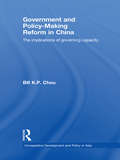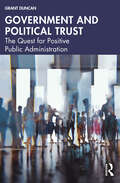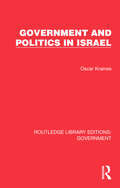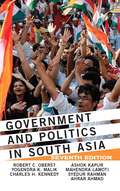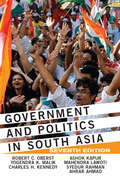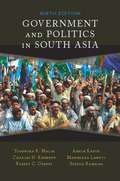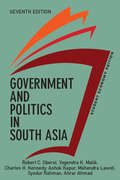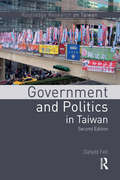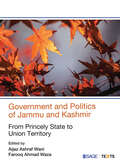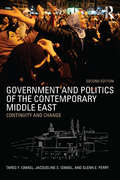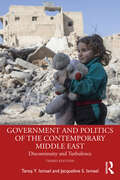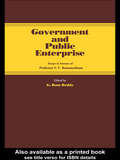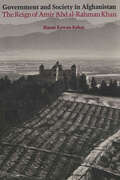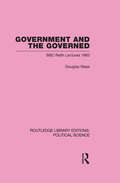- Table View
- List View
Government and Policy-Making Reform in China: The Implications of Governing Capacity (Comparative Development and Policy in Asia #Vol. 6)
by Bill K.P. ChouChina’s rapid economic development has not translated automatically into political development, with many of its institutions still in need of major reform. In the post-Mao era, despite the decentralization of local government with significant administrative and fiscal authority, China’s government and policy-making processes have retained much of the inefficiency and corruption characteristic of the earlier period. This book analyzes the implementation of government and policy-making reform in China, focusing in particular on the reform programmes instituted since the early 1990s. It considers all the important areas of reform, including the enhancement of policy-making capacity, reform of taxation and fund transfer policies, tightening of financial control, civil service reform and market deregulation. Bill K.P Chou assesses the course of policy reform in each of these areas, considers how successful reforms have been, and outlines what remains to be done. In particular, he explores the impact on the reform process of China’s entry into the WTO in 2001, demonstrating that the process of reform in China has been one of continuous conflict between the agenda of political elites in central government, and the priorities of local leaders, with local agents often distorting, delaying or ignoring the policies emanating from the central government.
Government and Political Trust: The Quest for Positive Public Administration
by Grant DuncanIf the government is a problem, what should be done about it? A new era of intervention has begun following a global pandemic, climate change and strategic rivalry – but will a better government emerge from this? Political turmoil and polarisation are causing people to question how well their societies are governed and how leaders conduct themselves, while urgent practical challenges are arising for public policy and administration. A deeper concern, then, is to re-examine the nature and problem of government itself. This study covers historically enduring dilemmas that will persist, as well as emerging issues such as climate change and Artificial Intelligence. It sets out core concerns that systems of government, of all kinds, must address. The wide diversity of political beliefs and constitutions calls for toleration in order to foster effective collaboration across types and levels of government. Each country, community and individual follows their own path, but we can all do something to help restore political trust and to raise standards of public administration. An essential guide for those seeking general and lasting principles of good government, including elected officials, civil servants, community leaders and students of politics and public policy.
Government and Politics in Israel (Routledge Library Editions: Government)
by Oscar KrainesOriginally published in 1961, this book provides a clear authoritative work of reference, surveying not only constitutional form, but also actual political practice. The author deals in turn with the Knesset, the political parties and the electoral system, Cabinet, Presidents and Judiciary, the basis of citizenship and civil rights, the administrative structure, local government and foreign policy. The book also emphasizes the precarious balance of the new state of Israel in which immigrants exceeded the original population.
Government and Politics in South Asia
by Yogendra K Malik Charles Kennedy Ashok Kapur Syedur Rahman Mahendra Lawoti Ahrar Ahmad Robert C OberstThis comprehensive but accessible text provides students with a systematic introduction to the comparative political study of the leading nations of South Asia: India, Pakistan, Bangladesh, Sri Lanka, and Nepal. The seventh edition is extensively revised and updated, benefiting from the fresh perspective brought on by adding a new author to the team. New material includes discussions of political parties and leaders in India, the Zardari regime and changes to the Pakistani constitution, the rocky relationship between Pakistan and the Obama administration, new prospects and dangers facing Bangladesh, continuing political violence in Sri Lanka, and the troubles facing Nepal as it attempts to draft a new constitution. Organized in parallel fashion to facilitate cross-national comparison, the sections on each nation address several topical areas of inquiry: political culture and heritage, government structure and institutions, political parties and leaders, conflict and resolution, and modernization and development. A statistical appendix provides a concise overview of leading demographic and economic indicators for each country, making Government and Politics in South Asia an invaluable addition to courses on the politics of South Asia.
Government and Politics in South Asia
by Ashok Kapur Syedur Rahman Mahendra Lawoti Ahrar Ahmad Robert C. Oberst Yogendra K. Malik Charles H. KennedyThis comprehensive but accessible text provides students with a systematic introduction to the comparative political study of the leading nations of South Asia: India, Pakistan, Bangladesh, Sri Lanka, and Nepal. The seventh edition is extensively revised and updated, benefiting from the fresh perspective brought on by adding a new author to the team. New material includes discussions of political parties and leaders in India, the Zardari regime and changes to the Pakistani constitution, the rocky relationship between Pakistan and the Obama administration, new prospects and dangers facing Bangladesh, continuing political violence in Sri Lanka, and the troubles facing Nepal as it attempts to draft a new constitution. Organized in parallel fashion to facilitate cross-national comparison, the sections on each nation address several topical areas of inquiry: political culture and heritage, government structure and institutions, political parties and leaders, conflict and resolution, and modernization and development. A statistical appendix provides a concise overview of leading demographic and economic indicators for each country, making Government and Politics in South Asia an invaluable addition to courses on the politics of South Asia.
Government and Politics in South Asia
by Robert C OberstThis comprehensive but accessible text provides students with a systematic introduction to the comparative political study of the leading nations of South Asia: India, Pakistan, Bangladesh, Sri Lanka, and Nepal. The seventh edition is extensively revised and updated, benefiting from the fresh perspective brought on by adding a new author to the team. New material includes discussions of political parties and leaders in India, the Zardari regime and changes to the Pakistani constitution, the rocky relationship between Pakistan and the Obama administration, new prospects and dangers facing Bangladesh, continuing political violence in Sri Lanka, and the troubles facing Nepal as it attempts to draft a new constitution.Organized in parallel fashion to facilitate cross-national comparison, the sections on each nation address several topical areas of inquiry: political culture and heritage, government structure and institutions, political parties and leaders, conflict and resolution, and modernization and development. A statistical appendix provides a concise overview of leading demographic and economic indicators for each country, making Government and Politics in South Asia an invaluable addition to courses on the politics of South Asia.
Government and Politics in South Asia
by Yogendra K MalikThis comprehensive but accessible text provides students with a systematic introduction to the comparative political study of the leading nations of South Asia: India, Pakistan, Bangladesh, Sri Lanka, and Nepal. The seventh edition is extensively revised and updated, benefiting from the fresh perspective brought on by adding a new author to the team. New material includes discussions of political parties and leaders in India, the Zardari regime and changes to the Pakistani constitution, the rocky relationship between Pakistan and the Obama administration, new prospects and dangers facing Bangladesh, continuing political violence in Sri Lanka, and the troubles facing Nepal as it attempts to draft a new constitution. Organized in parallel fashion to facilitate cross-national comparison, the sections on each nation address several topical areas of inquiry: political culture and heritage, government structure and institutions, political parties and leaders, conflict and resolution, and modernization and development. A statistical appendix provides a concise overview of leading demographic and economic indicators for each country, making Government and Politics in South Asia an invaluable addition to courses on the politics of South Asia.
Government and Politics in South Asia, Student Economy Edition
by Robert OberstWestview Press is pleased to offer a new, paperback Student Economy Edition of our best-selling title, Government and Politics in South Asia. This Student Economy Edition contains the same material as the seventh edition of Government and Politics in South Asia (ISBN: 9780813348797)- the same text, the same figures, and the same page numbers- and is available to own for about the same price as renting the print book.This comprehensive but accessible text provides students with a systematic introduction to the comparative political study of the leading nations of South Asia: India, Pakistan, Bangladesh, Sri Lanka, and Nepal. The seventh edition is extensively revised and updated, benefiting from the fresh perspective brought on by adding a new author to the team. New material includes discussions of political parties and leaders in India, the Zardari regime and changes to the Pakistani constitution, the rocky relationship between Pakistan and the Obama administration, new prospects and dangers facing Bangladesh, continuing political violence in Sri Lanka, and the troubles facing Nepal as it attempts to draft a new constitution.Organized in parallel fashion to facilitate cross-national comparison, the sections on each nation address several topical areas of inquiry: political culture and heritage, government structure and institutions, political parties and leaders, conflict and resolution, and modernization and development. A statistical appendix provides a concise overview of leading demographic and economic indicators for each country, making Government and Politics in South Asia an invaluable addition to courses on the politics of South Asia.
Government and Politics in Taiwan (Routledge Research on Taiwan Series)
by Dafydd FellWritten by an experienced teacher and scholar, this new and revised second edition of Government and Politics in Taiwan introduces students to the big questions concerning change and continuity in Taiwanese politics and governance. Taking a critical approach, Dafydd Fell provides students with the essential background to the history and development of the political system, as well as an explanation of the key structures, processes and institutions that have shaped Taiwan over the last few decades. Using key features such as suggestions for further reading and end-of-chapter study questions, this textbook covers: • the transition to democracy and party politics; • cross-Strait relations and foreign policy; • electoral politics and voting; • social movements; • national identity; • gender politics. Having been fully updated to take to take stock of the 2012 and 2016 General Elections, the Sunflower Movement and new developments in cross-Strait relations, this is an essential text for any course on Taiwanese politics, Chinese politics and East Asian politics.
Government and Politics in the Lone Star State (Ninth Edition)
by Clay Robison Joanne Connor Green L. Tucker Gibson Jr.The book guides students through the historical, economic, demographic, and political environment that has made Texas government and political culture what it is. It explains Texas’s governmental institutions, the players who influence them, and how these factors compare to those in other states. The 2014 Elections and Updates Edition has been revised to meet the outcomes instituted by the Texas education commission board, and includes updated content on the major issues in today’s headlines to help students become informed voters and participants in Texas’s dynamic policymaking process.
Government and Politics of European Union (8th Edition)
by Neill NugentThe definitive textbook on EU politics and governance, now in its 8th edition, has been thoroughly updated throughout to take into account the ongoing developments and evolution of the EU. Major changes, recent developments, and the major crises that have befallen the union in recent times are analysed within this context. This includes eurozone crisis, the migration crisis, and the UK’s decision to leave the EU. Acclaimed author and academic Neill Nugent has written a comprehensive text, enabling students with no prior knowledge of the EU to master the subject. By detailing the historical evolution of European integration, Nugent gives the necessary context to his exhaustive analysis of policies, process, institutions and treaties. This has grown to include two new chapters on Member State Relations and Interest Representation. The final section considers concepts and theories with EU studies, providing a succinct, accessible introduction to theory, which can be read as standalone chapters. Completely redesigned and updated throughout with a new structure to increase readability and packed with numerous pedagogical features -document excerpts, case studies, maps figures - and supported by a fully stocked companion website with resources for both students and lecturers, this text is an essential for students new to EU studies.
Government and Politics of Jammu and Kashmir
by Aijaz Ashraf Wani Farooq Ahmad WazaThis textbook offers a lucid and comprehensive understanding of J & K politics, government and governance. Government and Politics of Jammu and Kashmir provides an engaging account of different aspects of the key themes of politics and governance structures of Jammu and Kashmir, right from the formation of the State to its bifurcation into two Union Territories. Spanned over 13 chapters, the book aims to provide a clear idea about the political awakening of the people in the state, creation of leadership and political formations leading to the movement against Princely Order. The analysis and findings on different themes are presented as succinctly and lucidly as possible. This book will serve as a helpful companion for undergraduate and post-graduate students of political science as well as civil service aspirants. Key Features: • First-of-its-kind textbook on the politics of Jammu and Kashmir • Concise and well-balanced coverage of state politics in India • Incorporates recent literature, latest data and illustrations • Includes pedagogically rich content, which closely follows UGC curriculum guidelines for the subject
Government and Politics of Texas: A Comparative View (7th edition)
by Gary M. HalterExamining and comparing the Lone Star State to the rest of the nation, this text provides students with a broad understanding of the factors that make Texas unique. The seventh edition includes a brand new chapter on Public Policy in Texas, with emphasis on policies directly relating to students. Updated information on a host of issues in Texas state and local government, including population growth, constitutional amendments, and changing partisanship in the Texas legislature is also included.
Government and Politics of the Contemporary Middle East: Continuity and change
by Jacqueline S. Ismael Tareq Y. Ismael Glenn PerryThis exciting new edition of the successful textbook for students of Middle Eastern politics provides a highly relevant and comprehensive introduction to the complexities of a region in constant flux. Combining a thematic framework for examining patterns of politics with individual chapters dedicated to specific countries, the book places the very latest developments and long-standing issues within an historical context, introducing key concepts from comparative politics to further explore the interaction between Middle Eastern history and the region’s contemporary political development. Presenting information in an accessible and inclusive format, the book offers: • Coverage of the historical influence of colonialism and major world powers on the shaping of the modern Middle East. • A detailed examination of the legacy of Islam. • Analysis of the political and social aspects of Middle Eastern life: alienation between state and society, poverty and social inequality, ideological crises and renewal. • Case studies on countries in the Northern Belt (Turkey and Iran); the Fertile Crescent (Iraq, Syria and Lebanon, Israel/Palestine); and those West and East of the Red Sea (Egypt and the members of the Gulf Cooperation Council), moving through an historical examination to close analysis of the most recent developments and their political and social impacts. • Extensive pedagogical features, including original maps and further reading sections, provide essential support for the reader. A key introductory text for students of Middle Eastern politics and history at advanced undergraduate and postgraduate levels, this new edition has been extensively updated to also become a timely and significant reference for policy-makers and any motivated reader.
Government and Politics of the Contemporary Middle East: Discontinuity and Turbulence
by Jacqueline S. Ismael Tareq Y. IsmaelThis exciting new edition of the successful textbook for students of Middle Eastern politics provides a highly relevant and comprehensive introduction to the complexities of a region in constant flux. Combining a thematic framework for examining patterns of politics with individual chapters dedicated to specific countries, the book places the very latest developments and long-standing issues within an historical context. This third edition extends its analysis to post-2015 developments in the region, as well as expanding the range of pedagogical features on offer. Presenting information in an accessible and inclusive format, the book offers: Coverage of the historical influence of colonialism and major world powers on the shaping of the modern Middle East A detailed examination of the legacy of Islam Analysis of the political and social aspects of Middle Eastern life, including alienation between the state and society, poverty and social inequality, and ideological crisis and renewal Case studies on countries in the Fertile Crescent (Iraq, Syria and Lebanon, and Israel/Palestine); the Northern Belt (Turkey and Iran); and those West and East of the Red Sea (Egypt and the members of the Gulf Cooperation Council) A key introductory text for students of Middle Eastern politics and history at advanced undergraduate and postgraduate levels, this new edition has been extensively updated to also become a timely and significant reference for policy-makers and any motivated reader.
Government and Public Enterprise: Essays in Honour of Professor V.V. Ramanadham
by G. Ram ReddyPublished in the year 1983, Government and Public Enterprise is a valuable contribution to the field of Politics.
Government and Society in Afghanistan: The Reign of Amir 'Abd al-Rahman Khan (CMES Modern Middle East Series)
by Hasan Kawun KakarAn authoritative study of the administrative, social, and economic structure of Afghanistan at the beginning of the twentieth century. Government and Society in Afghanistan covers a decisive stage in the country&’s history. The period covered—the reign of the &“Iron&” Amir Rahman Khan—was in many ways the beginning of modern Afghanistan as a cohesive nation. It was under the Amir that its borders were established, its internal unification completed, and the modern concept of nationhood implanted. Hsan Kawun Kakar considers both the internal and the external forces that influenced Afghanistan&’s development. Thus, modernization, centralization, and nationalization are seen as both defensive reactions to European imperialism and a necessary step toward capital formation and industrialization. The first part of the book covers the government of the Amir, from the personality of the ruler to a comprehensive overview of taxation and local government. The second part views these economic and social institutions from the perspective of the major segments of the populace—including nomads, townsmen, tribes, women, slaves, landowners, mullahs, merchants, and others.
Government and the Governed (Routledge Library Editions: Political Science #13)
by Douglas WassThis book, originally published in 1983 examines how effectively in Britain central government is equipped to secure efficiency and responsiveness and argues that as a result of shifts in the balance of power between the executive arm of government in Whitehall and the legislature in Parliament, the British system of government is neither as efficient, nor as responsive to popular will, as a strong democracy requires. The book considers which reforms are most likely to improve the efficiency of the government and to prove acceptable to British political and historical traditions. It reviews the way in which public debate is informed by government release of information and by the press and raises the question of how good a guide to the popular will referenda and public opinion polls are.
Government by Dissent: Protest, Resistance, and Radical Democratic Thought in the Early American Republic
by Robert W.T. Martin"The most thorough examination we have of how early Americans wrestled with what types of political dissent should be permitted, even promoted, in the new republic they were forming. Martin shows the modern relevance of their debates in ways that all will find valuable—even those who dissent from his views!"—Rogers M. Smith, Christopher H. Browne Distinguished Professor of Political Science, University of Pennsylvania Democracy is the rule of the people. But what exactly does it mean for a people to rule? Which practices and behaviors are legitimate, and which are democratically suspect? We generally think of democracy as government by consent; a government of, by, and for the people. This has been true from Locke through Lincoln to the present day. Yet in understandably stressing the importance—indeed, the monumental achievement—of popular consent, we commonly downplay or even denigrate the role of dissent in democratic governments. But in Government by Dissent, Robert W.T. Martin explores the idea that the people most important in a flourishing democracy are those who challenge the status quo. The American political radicals of the 1790s understood, articulated, and defended the crucial necessity of dissent to democracy. By returning to their struggles, successes, and setbacks, and analyzing their imaginative arguments, Martin recovers a more robust approach to popular politics, one centered on the ever-present need to challenge the status quo and the powerful institutions that both support it and profit from it. Dissent has rarely been the mainstream of democratic politics. But the figures explored here—forgotten farmers as well as revered framers—understood that dissent is always the essential undercurrent of democracy and is often the critical crosscurrent. Only by returning to their political insights can we hope to reinvigorate our own popular politics.
Government by Investigation
by Paul C. LightPaul C. Light examines and evaluates the 100 most significant investigations of policy failures, bureaucratic mistakes, and personal misconduct undertaken by the U.S. federal government between 1945 and 2012. Launched by Congress or the president, sometimes by both at the same time, the investigations at the core of this book were driven by the search for answers about significant breakdowns in government performance. Light reveals which investigations were most effective, and why.stigations provides a deep history and analysis of these investigations, providing rare insight into why some great investigations succeeded, while others failed, and what investigators can do to increase the odds that their work will pay off in improved government performance and more effective public policy.Informed by a deep reading of investigatory histories, numerous interviews with legislators, commission members, and leading scholars, as well as his own experience and original research, Light undertakes his own search for answers to a long list of questions about how each of these investigations performed. Was the investigation visible and well led? Was it serious and thorough? Did it involve a particularly controversial issue or a powerful public figure? Were investigators given enough freedom to pursue their goals? Did they forge the bipartisanship so often associated with what he calls the "good investigation?" And most important, what are the most important drivers of ultimate impact? Light's analysis will inform practitioners and observers of government on what drives impact in the American system.
Government by Investigation
by Paul C. LightPaul C. Light examines and evaluates the 100 most significant investigations of policy failures, bureaucratic mistakes, and personal misconduct undertaken by the U.S. federal government between 1945 and 2012. Launched by Congress or the president, sometimes by both at the same time, the investigations at the core of this book were driven by the search for answers about significant breakdowns in government performance. Light reveals which investigations were most effective, and why.
Government by Natural Selection (Routledge Library Editions: Evolution #13)
by Hugh TaylorOriginally published in 1915, Government by Natural Selection looks at the historical advancement of government through the lens of the Darwinian theory of natural selection. The book examines the history of government and its formation, right up until the early 20th century, when the book was first published. The book suggests that there is a link between Darwinian theory and the development of humans in societies, and that this in turn affected the formation of government over the course of history. The book uses not only Darwinian theory to examine history and the formation of government, but philosophers from both antiquity and the 19th century. This book provides a fascinating examination of politics and history through the application of science, and will be of interest to anthropologists, historians and academics of politics alike.
Government by the People
by James Macgregor Burns Thomas E. Cronin David B. Magleby J. W. Peltason David M. O'BrienThis comprehensive, classic book takes readers from on-lookers to participants. "Government by the People" lets them see democracy as the participatory government that it is. Covers 2000 Presidential Election, constitutional democracy, political culture and ideology, campaigns and elections, the Presidency, the judiciary, and much more. Explains how Congress and the President work together. For anyone interested in American Government.
Government by the People (AP Edition) (2014 Elections and Updates Edition) (25th Edition)
by Paul C. Light David B. Magleby Christine L. Nemacheck<p>As the title of our book suggests, we view the idea of government by the people as a defining element of American politics and government. From the Mayflower Compact to the Declaration of Independence to the expansion of rights and liberties to more and more citizens in the last century, we have expanded on the idea of self-government. Too often, Americans take their basic rights to life, liberty, and the pursuit of happiness for granted. But these rights were guaranteed neither by those who wrote our Constitution nor by the citizens who have worked, one generation after another, to expand these rights and set our government's course. Rather, government by the people today depends on citizens who are informed and involved in the decisions and processes of our constitutional democracy. <p>We have written this book with the aim of informing you about why you have a stake in our government and how you can become involved. The Framers of our Constitution warned us that we must always safeguard our rights, liberties, and political institutions. But we cannot do so without first understanding the basic rules of the game set by the Constitution. We must see the presidency, Congress, the federal bureaucracy, and the Supreme Court not as a remote "federal government" but as institutions that affect each of us every single day. Government by the people depends on people informing themselves and participating. It is not something that can be outsourced or that a generation can decide to take a pass on.</p>
Government by the People (Twenty-Second Edition)
by Paul C. Light David B. Magleby David M. O'Brien J.W. Peltason [et al.]Building on decades of authoritative scholarship, this completely updated text continues to offer accessible, carefully crafted, and straightforward coverage of the foundations of American politics, as well consistent focus on the achievements of a government by the people In an increasingly cynical world, GBTP emphasizes that politics matters and encourages, motivates, and even inspires students-with accounts of individual and collective acts of courageousness, intellect, and integrity in the political arena-to be effective and informed citizens. With each chapter now framed by nationally-selected learning objectives and chapter mastery self-tests, several compelling new features, and an all new contemporary design, this thoroughly updated Twenty-Third Edition continues in the book's long tradition for excellence. As we enter this very complex political era, there is no more reliable or more relevant text to help you advance your students from being simple onlookers to knowledgeable participants in the American political experience.
